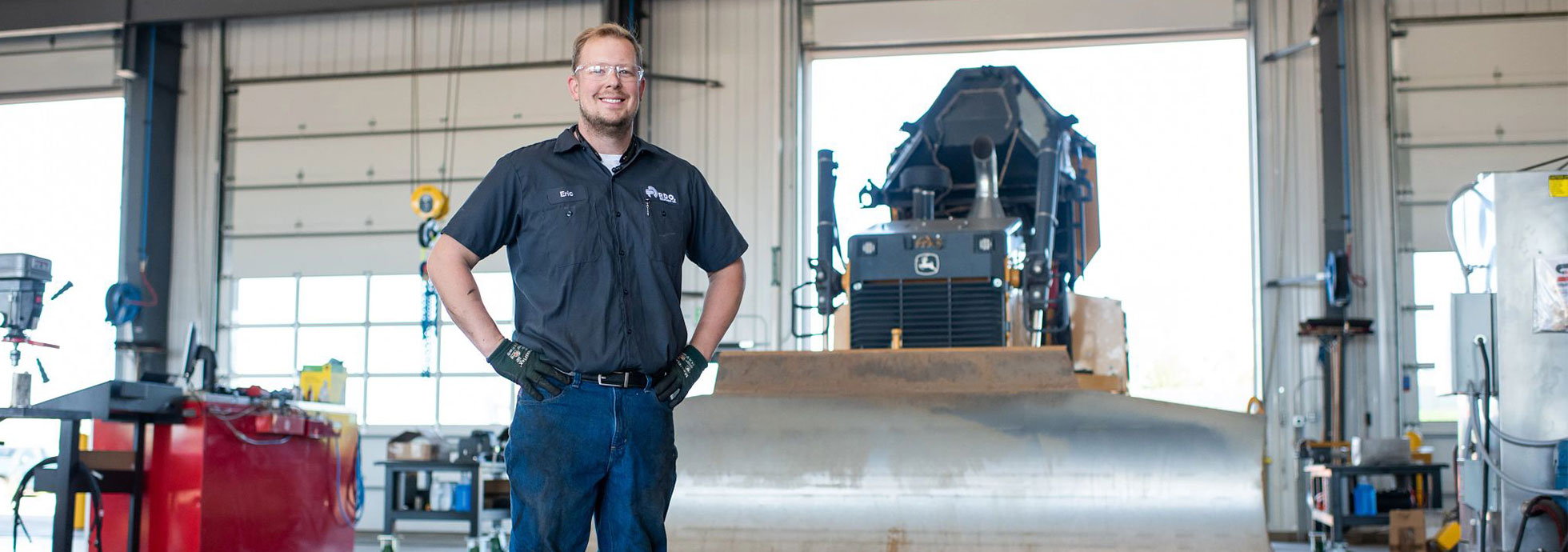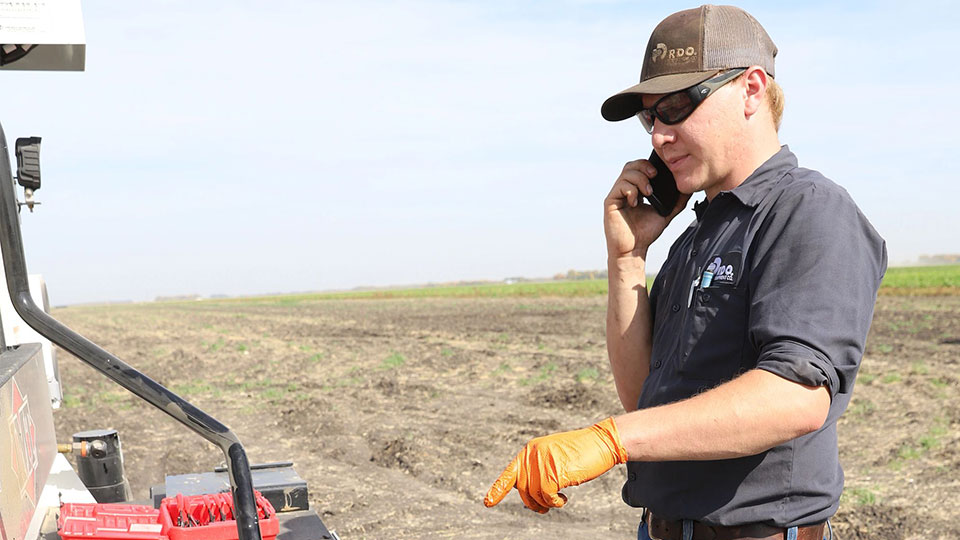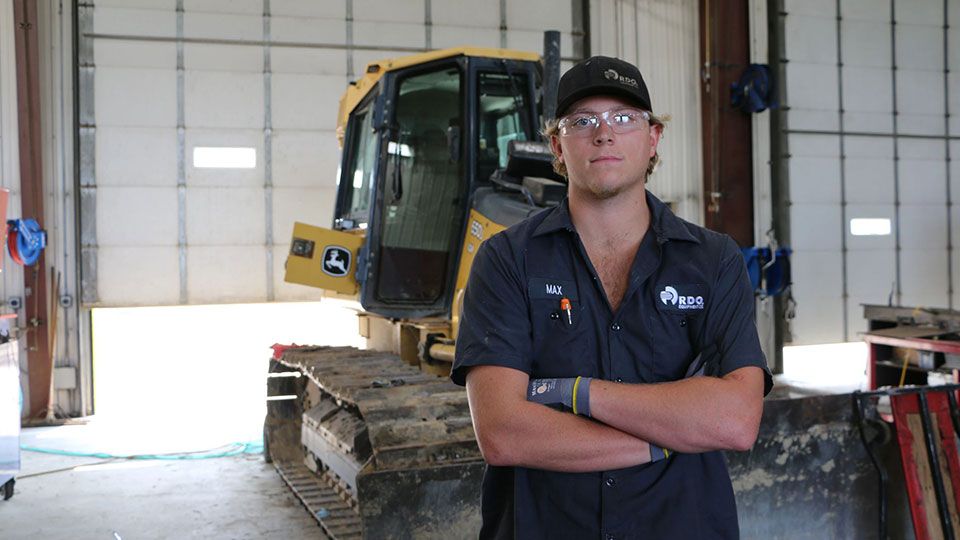
Interviewing for a new job as a diesel technician can be intimidating. Whether you’re interviewing for your first position or your next opportunity, you want to put your best foot forward throughout the interview process by being prepared.
But what kind of questions should you expect to be asked in these interviews?
Should you come prepared to answer highly technical questions, or will they focus on your experience and goals?
What about bringing questions to ask? Is that important?
At RDO Equipment Co., our team of service technicians is constantly growing. As a result, we regularly interview diesel mechanics for both internships and full-time roles.
This article lists 11 common questions we like to ask diesel mechanics during their interviews and why. You’ll also find some tips for answering them. While this isn’t a guaranteed list of what you’ll be asked during your next mechanic interview, especially if you’re not interviewing at RDO, use it as a guide.
Some of these questions could pop up, and being prepared to answer them will help you stand out:
This question helps the interviewer(s) better understand your interests and goals. In a more complex service environment where multiple types of products (brands, product lines, etc.) are worked on, this question helps the hiring manager(s) know where to potentially slot you in.
Additionally, this question could be answered by outlining the equipment systems you’re most interested in working on, like engines or electrical and hydraulic systems.
Tip: Whether it’s construction equipment, agriculture machinery or electrical systems, try to pick something you’re passionate about. Watching a candidate’s eyes light up when talking about what they want to work on is moving for hiring managers who like to add passionate people to their teams.
This is a big one. The last thing anyone wants (you, the hiring manager, the company, the service team) is for you to start this new job only to leave soon after because it wasn’t a good fit.
With this question, or one similar, an employer is trying to gauge your expectations for your work environment so they can decide whether they can meet them.
To answer this question, you should talk about the kind of culture you’re looking for, the type of work environment you prefer, your expectations regarding tooling (who supplies what) and what kind of support you’d like to receive while at work.
Tip: Use this as an opportunity to find out more about whether each company is a potential fit for you. How are they responding to your answers? Do they seem surprised or unsure? That might be a sign they aren’t on the same page. If this question doesn’t come up, “What’s it like to work here?” could be a good question to ask when it’s your turn.

From an employer’s perspective, it’s always a good sign if the applicant has researched the company before their interview. Regardless of the business you’re interviewing with, expect to get this kind of question at some point.
With this question, your potential employer is trying to discover what you know about the business and why you want to join it. Having a couple of key points of interest can go a long way toward showing your commitment to joining the company.
Tip: Try your best to learn a little bit about each company you apply to. While it doesn’t have to be much, research their values, history, benefits and leadership team. Also, if you know any, reach out to current employees to find out what it’s like to work there. All of this will help you knock this question out of the park.
Sign Up: Service Technician Monthly Newsletter
Become a more profitable, successful mechanic with insights and resources sent to your inbox every month.
Given the opportunity, companies like to hire people who have a vision for where they want to take their careers.
This question is used to find out a little bit more about yours. Do you want to move into management eventually, or would you prefer to move into a field service position? Are you passionate about learning and would like to continue to develop your skills?
Let them know what you’re thinking — it’s also ok if you’re unsure!
Tip: If you have career goals, you want to make sure the company you choose can accommodate them. Explain to each employer where you hope to be and what you want to accomplish over the next five years. This doesn’t have to be anything too big, especially if you’re a new technician. Instead, highlight some areas where you’d like to improve or skills you want to learn.
This is a very common interview question, regardless of profession. When you apply for a job at their company, it’s natural for the hiring manager to wonder why you’re looking for a change.
This helps them to get to know you better and understand how your current circumstances aren’t living up to your expectations. By understanding why you’re looking, an employer can also verify that they’re the right fit for your needs.
Tip: You’re probably looking for a new role for a reason or two. Try your best to express them.
If it’s benefits or pay, explain what’s missing in your current situation. If it’s the work environment, dig into what’s not working for you. Or, if it's advancement opportunities, explain where you’d like to be and the help you need to get there. It’s also important to note you shouldn’t disparage your current/former employer. Instead, talk about the conversations you’ve had or steps you’ve taken to address the situation.

Once your interviewer has gotten to know you and what you’re looking for in your next opportunity, you should start getting into more technical questions.
Hiring managers may use this open-ended question to discover more about your technical diesel mechanic experience and how well it applies to their company.
For example, while they’re similar in many ways, mechanics working on class-eight semi trucks don’t deal with as much hydraulic/electrical troubleshooting and repairs as those working on heavy-duty construction equipment.
There can be a big learning curve for a mechanic making this kind of switch.
Tip: Use this as an opportunity to show off a little. If you’ve been a diesel mechanic for a long time, you probably have a lot of great experience to share.
If you’re transitioning from one product type to another (or working on products from a different manufacturer), talk about how you’ve learned something new previously. This will help to demonstrate your ability to learn new techniques and systems.
There’s no shortage of mechanic training(s) and certifications. Whether it’s on a certain machine system or product line, employers want to know what you’ve been taught. This helps them understand where you’re at with your knowledge and where you might still want to develop.
If you have certifications from a manufacturer like John Deere or from an accredited institution, talk a little bit about them. Or if your former employer gave you regular training, explain what that was like.
Tip: Once again, this can be used as an opportunity to highlight your willingness to learn new things — particularly if you’re changing industries.
Tools, tools and more tools. Every mechanic has them, and every job requires them, but not every company provides the same kind of tools. To understand where you’re at with your tools and what you would want them to help you acquire or provide, an employer may ask about your toolset.
Tip: Talk to the employer about what tools they usually provide technicians and whether they see any areas where you might need to add tools to your toolbox. This can be a big expense, so you’ll want to understand this ahead of time.
If you’re fresh out of school, this could be a bit tougher to answer. That said, for the most part, when you’re asked about your strengths, you should have a good idea of what you’re best at.
Use this opportunity to talk about your ability to fix complex mechanical issues and efficiently perform repairs. Sell yourself a little bit when this question comes up.
Tip: You probably feel more comfortable doing some jobs than you do others. Talk about examples of how you’ve used these strengths. It might also be a good idea to outline how you developed these skills.
If a company is asking about your strengths, they’ll probably ask about your weaknesses too. We all have them.
Recognizing what yours are is a big step to improving in these areas. Companies ask this to get an understanding of your level of self-awareness, your willingness to grow and your current abilities.
Tip: If you can think of areas where you could improve as a team member, technician or employee, talk about them. This doesn’t mean you need to highlight past failures, just talk about where you need further experience/training.
This is an essential question for a couple of reasons.
First, this opens up the floor for you to ask the questions that will help you evaluate whether each company is a good fit. Second, companies use this question to measure your engagement with the interview process. Someone who has quite a few questions ready to go is often serious about the opportunity.
Use this question to your advantage, which is usually asked near the end of your interview.
Tip: Come to each interview prepared with 3-5 questions. These can be about any number of things (here is a list of good questions to ask) but should highlight the areas you’re most interested in learning more about. If you’re worried about forgetting to ask something, bring a notebook with them written down. This is also a good way to take notes during the interview to reference later.
Related: 12 Questions to Ask in Your Next Diesel Technician Interview
Being prepared to answer all kinds of questions is a great way to ensure a successful interview experience. Great companies are always looking to add motivated, talented and ambitious mechanics to their shops. If you can ace your interview and show that you’d be a good fit, joining a new (or your first) company won’t be difficult.
While this list is a good start, there are hundreds of other questions you might be asked. That said, when it comes to acing your interview, here are some things to prioritize:
Having these things prepared and walking in with confidence will go a long way.
If you’re looking for the next step in your diesel mechanic career, start the process of joining RDO in 10 minutes or less. Simply find a role in your area, fill out the application and join a growing company dedicated to your success.
Whether you’re an experienced technician with years of heavy equipment repairs under your belt or someone looking for their first opportunity, we have options all over the U.S. for you.
If you have any questions, please don’t hesitate to reach out. We’re more than happy to help you on your journey toward building a service technician career you’re proud of.